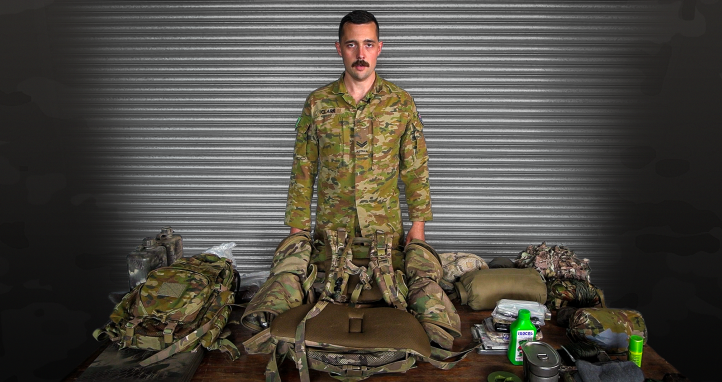'Success comes from being physically fit, tactically skilled & mentally ready... when times get tough, use your disappointments as motivation'
– Johnathan Thurston, Australian Rugby League Legend[i]
Introduction
The Elite: Think like an Athlete, Succeed like a Champion – 10 things the Elite do Differently complements innovation occurring throughout the Australian Defence Force (ADF) on examining, measuring and testing how enabled human performance empowers people to reach their personal, professional and cultural potential.
Dr Jo Lukins is a North Queenslander who, in 2016, was an inaugural adviser to the 3rd Brigade Vasey Resilience Centre, which is now the Brigade’s Human Performance Centre. To this day, Dr Lukins’ leadership in North Queensland continues strengthening our people in their assessment and realisation of their own peak performance.
Human performance programs in the ADF, like Soldier recovery programs in the past decade, are most effectively designed, developed, tested, trialled and evaluated through our newest workforce. These people are recent entrants to the ADF who, eventually, will lead our organisation. They are the supervisor, specialist, technician, tradesperson and artisan of our workforce. Involved in the daily tactical actions of our organisation, connected with communities, allies and partners, they are our workforce innovators.
Leadership from the ADF’s newest workforce is most directly connected with our largest troop concentrations on ships, in brigades and throughout our air fleet. If, in their day-to-day leadership and actions, our newest workforce can innovate and enable human performance, then the ADF can effectively surge to engage, prepare, build and reform in defending Australia and its national interests.
Optimised human performance represents a capability edge for the ADF. Supporting the achievement of this edge, The Elite provides timely guidance for our workforce to read, consider, debate and utilise.
The Elite: Think like an athlete succeed like a champion – 10 things the elite do differently
Noting the chapters of The Elite are standalone and can be independently read, Dr Lukins’ ten key skills elite athletes employ as part of their success include:[ii]
1. Mindset master plan: apply performance thinking, or a performance mindset, in place of fixed thinking. Remove your ‘I can’t do that task or skill’ language and insert ‘I can’t do that task or skill, yet’. Mindset is what defines your resilience. Challenge yourself and maintain your mindset to continuously prepare, train, compete, prepare, train, compete. Know the difference between your true limitations and your personal choices. Consider your potential rather than be limited by your current ability. It doesn’t matter what happens to you. What matters is how you respond.
2. Success on autopilot: enhance your self-control and increase your daily healthy habits. Habits do your thinking for you. Take advantage of our human proclivity for routine, where around 40% (14,000) of our approximately 35,000 daily actions consist of habits and daily sequences, or contingency behaviours, such as make bed, brush teeth, eat breakfast, look at smart phone, drive to work, drink coffee, watch TV, etc. All habits have consequences. You will not always be disciplined, so you need daily healthy habits. Through micro-adjustments to your life, employ healthy habits to reduce your decision-making requirements and free up your mind for creative thinking. Build your own high performance and resilience, through appropriate application of these fundamental human performance habits and needs:
- hydrate
- sleep
- ethical behaviour and decision making
- connections to family, friends and community
- nutrition
- exercise, including physical, mental and spiritual
- floss
3. The [Roger] Bannister effect: find new ways to push boundaries, learn, innovate and excel through working to define your purpose and awaken your creativity by seeing things from a new perspective. Keep your eye on the objective, trust yourself and finish strongly. Create a personal bias for learning and commitment. Seek advice through talking less, leading with questions and listening. As adults we forget the power of questioning where, on average, we ask 10-30 questions per day. In contrast, as toddlers, we asked, on average, 250-300 questions per day.
4. Systems in place: understand what tasks and elements enable you to function and reach your personal and professional potential. Map these tasks and elements, ensuring that you follow them regularly to achieve your goals. Have a system in place, know your system, follow your system, and prepare to adapt and change as needed.
5. Tell it straight: honestly assess your strengths and weaknesses to remain measured, grounded, realistic, grateful and humble. Take responsible action when you are wrong. Understand your own truth. Observe, understand and respect the perspectives and feelings of others through building mutual trust, respect, commitment, communication and care.
6. Accept the challenge: accept the task at hand. Apply the US Navy SEAL 40 percent rule: when your mind is telling you that you have culminated, that you are exhausted, that you cannot possibly go any further, you actually possess another 40 percent of personal capacity. Discomfort is reaching a point where the hard work begins. Push through challenges by becoming comfortable with discomfort. Life provides us tough tasks. For our own growth and success, we must commence, continue, complete and excel at these challenging tasks. In place of perfection, strive for excellence in reaching your personal and professional potential.
7. Life-balance myth: ‘There’s no such thing as work-life balance. There’s work, and there’s life and there’s no balance’ Sheryl Sandberg, 2012.[iii]The resources you devote across the areas of your life are finite. Expertise in all areas is rarely achieved. Excellence is a choice, and the opportunity-cost of this choice manifests as reduced or poor work-life balance. If you devote your energies to excellence, and what matters to you, then finding the time to practice and reach your potential will require sacrifices in other areas of your life. Deliberate practice with the goal of improvement is disciplined, structured and requires effort.
8. In your corner: people matter. Loneliness is as much a threat to our longevity as smoking or alcoholism. Your success, wellbeing and performance are based on the people around you. People who buffer you from stress and whom you rely on for love, care and support. Understand who is in your corner and on your team. Be grateful for assistance and repay support you have received with your proactive support to others. There are four types of social support to select, blend and employ:
- tangible, help with the practicalities of life
- informational, help solve a problem
- esteem, emphasises people’s strengths and minimises their self-criticism
- emotional, physical and emotional comfort, including generously giving someone your time and listening to their story. Listen more, speak less and ask how you can best support people
9. The gratitude attitude: remain grateful, savour the moments and use happiness as one of your tools for success. By appreciating your opportunities, you will experience gratitude every day. Intentional activities allow us to act on our circumstances – through our thoughts, plans, and behaviours, including be kind to others, maintain a sense of personal control and be grateful for your life and the people in your life.[iv]
10. So it begins: understand the big picture. Savour your positive experiences. Share your talents with the world. Serve others. Enjoy the people, opportunities and experiences in your life knowing that every experience has an ending, yet through every ending comes a new beginning.
Conclusion
The Elite is a contemporary publication for ADF leaders who seek innovation in human performance to examine, measure, test and empower our people to reach their personal, professional and cultural potential. While The Elite offers ‘knowledge and insights to the mental strengths of great athletes and teams’, Dr Lukins concludes that ‘success is possible for everyone’ and your success is ‘100% yours’.
Human performance programs in the ADF are entering a period of change and transition to standardised best practice for our people. As occurred with Soldier recovery programs in 2015, our human performance programs are now ready to consolidate gains from innovators throughout Australia, and globally, as we work to enable peak performance for our people and their teams.
Ultimately, The Elite articulates that people reach their own potential through deliberate plans, daily actions, persistence and connections. Ideally, the ADF’s human performance programs will reflect the simplicity of this message.
The ADF’s newest workforce are ready for this change. They thrive in opportunities to excel and maximise their potential. As our workplace innovators, our newest workforce can enhance human performance through their day-to-day leadership and actions, enabling the ADF to engage, prepare, build and reform in defending Australia and our national interests.




